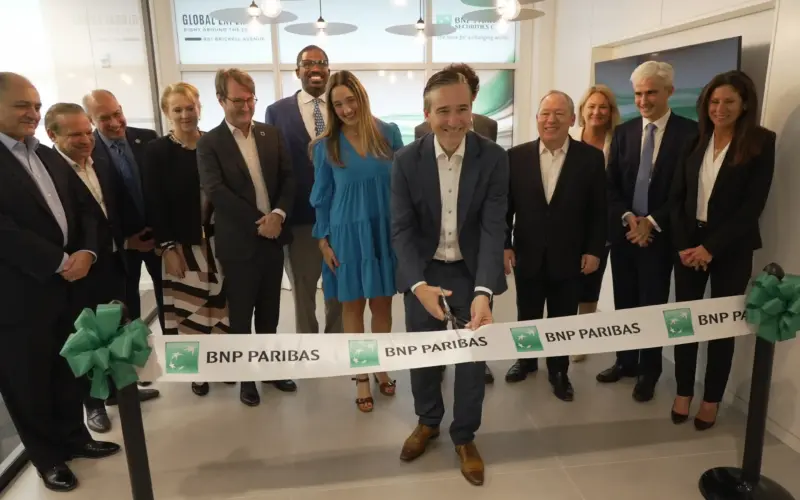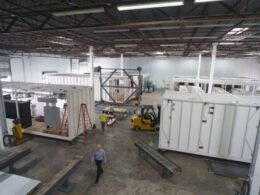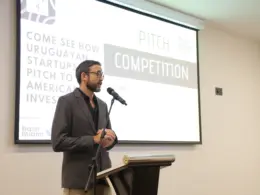When software company Kaseya moved its U.S. headquarters from Boston to Miami last year, it was heralded as another indicator of the city’s growing importance as a technology hub. At the time, Kaseya also announced it would spend $16 million renovating 101,871 square feet of commercial space in the downtown and hire more than 3,400 new employees.
Kaseya, a global provider of IT management and security software, was not the first – nor will it be last – of a slew of tech-oriented companies relocating to or starting up in Miami, joining the ranks of such firms as Blackstone, Nvidia, Microsoft, and Google. Scores of companies in other industries, from financial managers to medical providers, have also entirely relocated or moved divisions here.
With the new wave of corporate landings, thousands of jobs are being created. According to a recent report by the Miami-Dade Beacon Council, some 51 companies have announced plans to relocate or expand in the county, looking to hire nearly 15,000 new workers.
While many of these future employees will not necessarily be hired by high-tech companies, a preponderance – almost half– will be. “It’s been a targeted industry for us now going back more than a decade, just tech jobs in general. We have been slowly building this community, and now we have a fairly established technology ecosystem here,” says James Kohnstamm, former executive vice president of the Beacon Council, the job of which is to recruit and retain employers. And even workers in other industries need to be adept in the use of new technologies.
All of which begs the question: Where will these workers come from? Unlike Silicon Valley, Greater Miami has not had the same sort of high-tech labor pool to draw from. And without these workers, the new corporate landscape may be unsustainable. “Our concern is more in terms of once they’re here, how do we meet their needs? How do we connect them to the community? And how do we keep them here? Because as easily as they got here, they can just as easily leave,” says Alfred Sanchez, president and CEO of the Greater Miami Chamber of Commerce. And while the chamber has committees devoted to education and workforce development, Sanchez would be the first to say that we need more programs “to buttress and support the initiatives that are going on.”
The city’s response is a collective call to arms. Miami’s academic community, public institutions, private training companies, and tech firms are rising to the occasion with a broad array of initiatives to create a qualified labor pool to fill the ranks of high-tech (and non-tech) firms streaming to the city, as well as those needed by new startups.
INITIATING A RESPONSE
To meet the new demand, interaction and cooperation between academic institutions, private companies, and the public sector are needed. Already, area universities are amping up their curriculum, while corporations are paying private companies to train workers to fill the gap until new grads appear on the scene.
One leading organization that is connecting academia with the private and public sectors is Miami Tech Works, created last year with a $10 million grant from the Good Jobs Challenge, funded by President Biden’s Economic Development Administration (EDA). Miami Tech Works is distributing the grant to three academic institutions – Miami Dade College, Florida International University, and Florida Memorial University – to develop industry-led tech training.
The Miami Tech Works grant was applied for by Antonio Delgado, Miami Dade College’s Vice President of Innovation and Technology Partnerships, and it launched in the same month Kaseya made its announcement. Its program is being carried out in three phases.
Phase one created a Miami Tech Talent Coalition to determine how Miami could develop its tech sector sustainably. After surveying over 300 employers, the coalition created four groups: the small business group, the tech skills gap group, the emerging tech talent group, and the inclusive tech talent group. The assignment to oversee the execution of these groups went to Caryn Lavernia, a senior partner at Lab22c, a Miami consulting agency that connects companies, funding sources, entrepreneurs, and public institutions to grow Miami’s innovation ecosystem.
The second phase, says Lavernia, has been to bring industry and the community together to formulate plans for each group. Employers have met monthly with nonprofit organizations, academia, and government representatives to discuss pilot programs. These programs will provide the framework for any company to train, find, and keep tech talent in Miami; phase three will implement them.

The coalition is currently between phases two and three, with only the small business pilot program launched. It created a micro-internship initiative where students from the three funded universities (MDC, FIU, and FMU) can gain tech experience working with a small business. For example, students are now building small businesses their first websites; they will be paid and can put the tech experience on their resumes, while the business will have a website at a cheaper than market rate. Lavernia says all the groups will have launched their pilot programs by mid-2024.
The key to the success, says Lavernia, will be cooperation between the players. “In reality, the academic institutions are in competition with each other. And training providers are in competition with each other, the employers are also. But the reality of where we are is that we have to work together to build our workforce for the benefit of everyone… we’re competing globally for businesses to move here for talent. We should be collaborating internally to be a power player and compete against the large metros.”
THE ACADEMIC THRUST: MIAMI DADE COLLEGE (MDC)
Even with public/private initiatives like Miami Tech Works, academic institutions will have to do most of the heavy lifting. Out of all universities and colleges in South Florida, Miami Dade College (MDC) is arguably the most impactful in leading the charge to prepare Miami’s tech pipeline – and was already doing so prior to VP Delgado acquiring the Good Jobs Challenge grant. MDC began in the mid 2010s to expand its curriculum with a view to mobilizing Miami’s tech workforce. The results are current courses available for bachelor’s degrees in: computer engineering technology; cybersecurity; data analytics; information systems technology; and other tech-related areas like biotechnology. It also offers associate degrees in: animation and gaming; applied artificial intelligence; cloud computing; computer engineering; computer information technology; computer programming and analysis; cybersecurity; and database technology.
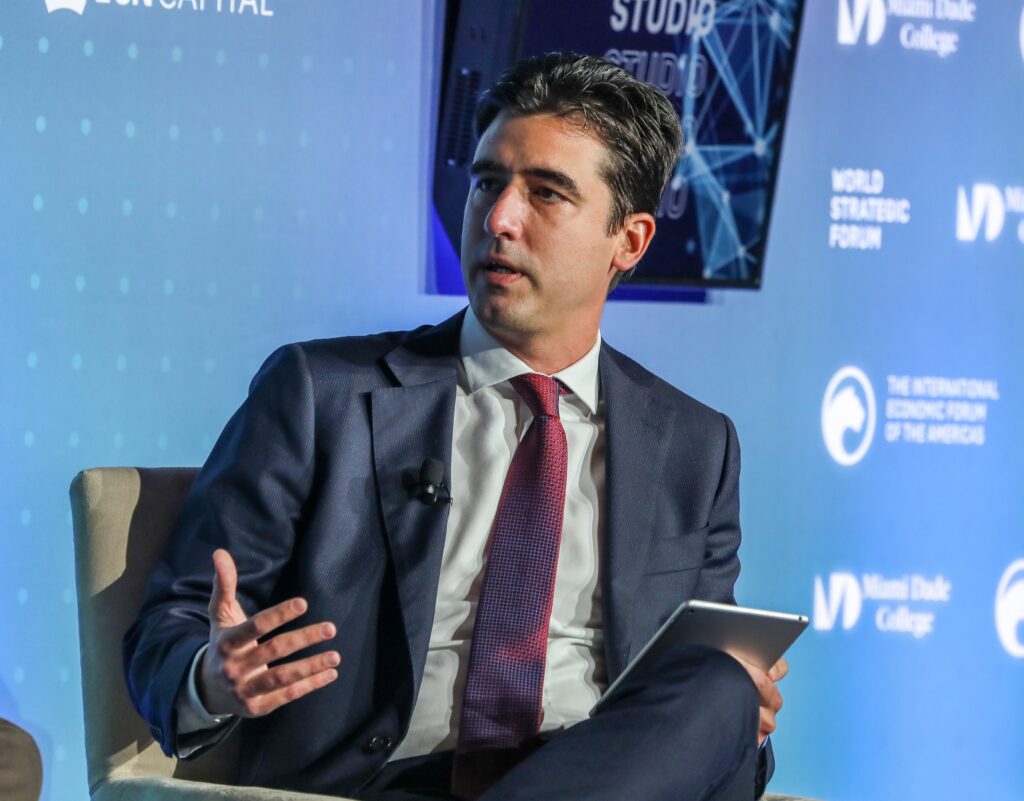
According to Delgado, MDC’s greatest strength is what many consider its greatest weakness: it is a community college. That status, with 120,000 students across eight campuses, allows MDC to have a wider reach than most 4-year academic institutions, translating into potentially more talent for the pipeline. For example, MDC currently has 12,000 students taking courses in its School of Engineering, Technology, and Design. MDC’s flexible course structure also makes it possible for high school students and working professionals to advance their education and skill sets.
“I think what differentiates us, first, is that we’re a community college choice so we’re based on the community, and we’re thinking about what skills are needed by companies when they’re looking for talent,” says Delgado. To that end, MDC is working with multiple industry partners across many of its schools to provide industry-level learning and resources for individuals looking to upskill. For example, with its Business and Innovation Technology Center (BIT), MDC offers industry certifications with Google, Hootsuite, HubSpot, and Bloomberg. Other companies are offering specific tech training, for example, Kaseya’s RITSM (Remote IT and Security Management) program.
“The role of Miami Dade College is not just as a transfer way to a university, but also a pathway to a job. That’s why the partnerships matter so much: to have ears on the ground and measure what exactly is needed from a workforce perspective, and then creating the program or improving the programs to meet those needs,” says Delgado. “That’s our goal.”
Pamela Fuertes, Dean of MDC’s Miguel B. Fernandez Family School of Global Business, Trade & Transportation, echoes Delgado’s remarks: “Workforce readiness is something that’s extremely important to us and to our mission because what we want to ensure is that we are preparing our students for their future professional careers.”

And Fuertes isn’t just referring to students pursuing a career in the tech industry. In the future, she says, all jobs will have some sort of tech component to them, so MDC is getting ahead of the curve by incorporating tech skills and literacy into all its programs.
Since 2019, for example, the college has been incorporating AI into its courses. In 2021, 500 MDC faculty members attended an AI workshop to learn how to best utilize the technology in their courses; the same year MDC received nearly $1 million from the National Science Foundation (NSF) to fund the development of AI courses. Now, they’re seeing the results. From using AI to predict character archetypes in literature like Harry Potter to helping students learn algebra through gamification, MDC president Madeline Pumariega says the college wants to emphasize the technology more in the coming years because it’s clear that AI is here to stay. Last year, MDC announced it would launch Florida’s first Bachelor of Science in Applied Artificial Intelligence, in place later this year; the program already has interest from over 300 students.

“When I met with students in January of ‘23 when other institutions were banning AI, they were like, ‘You’re not going to ban AI, right?’ And I said, ‘No, it’s like banning the internet. It’s like banning the Britannica Encyclopedia,’” says Pumariega. “It’s a tool that students are going to have to learn how to use.” Since technology is increasing in multiple industries from nursing to law enforcement, the college wants to provide students with skills needed in any industry pipeline. “We want artificial intelligence to be a digital skill that students could have access to, regardless of what their career pathway might be,” says Pumariega.
ON THE RESEARCH EDGE: FLORIDA INTERNATIONAL UNIVERSITY
Like MDC, FIU is one of the three academic institutions chosen for the Miami Tech Works grant. However, while MDC is focused on the technical skills gap in Miami’s incumbent workforce, FIU’s designation as an R1 Research Institution allows it to address different needs in the talent pipeline. While FIU has micro-credential programs that allow students and working professionals to build their tech stack, the university’s strength comes from its cutting-edge research programs and industry ties.
Even before Miami’s tech boom, FIU was already known for its technology-driven research programs. Its cybersecurity program recently received funding from Homeland Security to ensure the resilience of critical infrastructure. Its data management research laboratory is leading the way in using emerging technology to solve inefficiencies in standard data processing. The list goes on.
Steven Luis, the executive director for technology at FIU, says its research programs are one way that the university is keeping course material up to date. Within the College of Engineering and Computing, the university offers the bulk of its technology-related courses. It has undergraduate programs in cybersecurity, computer science, and information technology where students can choose a particular track. It offers graduate degrees in computer science, cybersecurity, data science, information technology, and telecommunications and networking. Moreover, the university has ABET accreditations for its computer science, IT, and cybersecurity programs among others; ABET (Accreditation Board for Engineering and Technology) ensures that students are trained on par with industry standards.

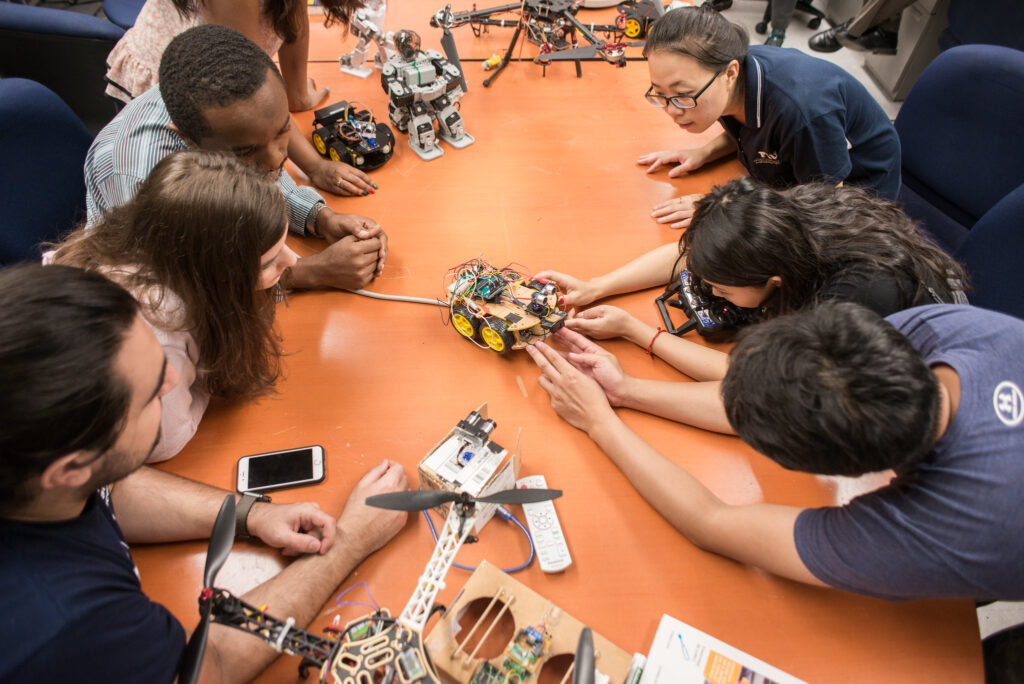
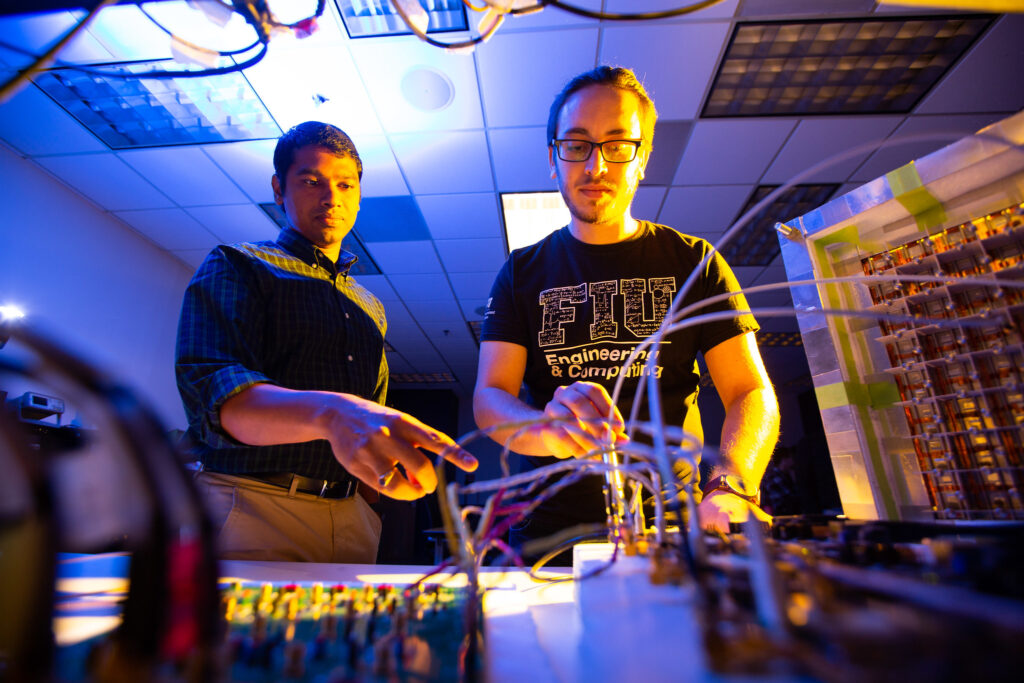
Luis also mentions opportunities for experiential learning in all FIU technology courses – for example, in the university’s cybersecurity program. “It’s all about advanced training. It’s about allowing students to understand how to build experiments. When you think of cybersecurity, it’s a cat-and-mouse game. You have bad actors that are constantly pushing the envelope. So, we need talent in the pipeline that is also capable of pushing the envelope,” says Luis.
The university’s new Innovation Engineering Complex is another way FIU is expanding its resources for tech training. The complex’s first building is set for completion late this year; the finished complex will include makerspace labs, active learning classrooms, and research labs. Interim Dean of the College of Engineering and Computing, Inés Triay hopes the complex will foster an atmosphere of innovation and creativity. “These buildings, which will become a pillar of academic excellence and innovation in South Florida, will ensure that the talent FIU cultivates, the interdisciplinary research it conducts, and the industry collaborations it engages in, pioneers the innovative solutions of tomorrow,” says Triay.
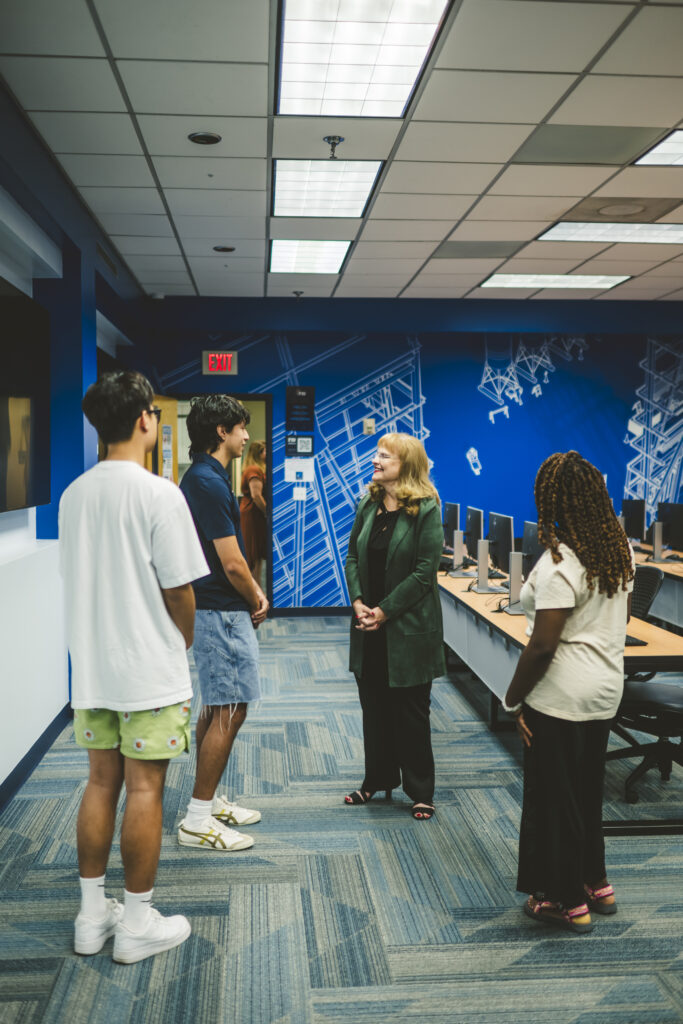
FIU also works closely with industry to implement a curriculum that meets demands. The university has a memorandum of understanding with Kaseya, for example, to create specific IT automation and advanced automation courses to train students for roles in the company; its faculty even had a hand in developing the company’s RITSM certification program. FIU works closely with other industry partners as well, like Microsoft, Google Cloud, and FPL, to guide curriculum for student placement after graduation.
ACCESSING MINORITY TALENT: FLORIDA MEMORIAL UNIVERSITY (FMU)
The third recipient of the Miami Tech Works grant, Florida Memorial University, is the only historically black university and college in South Florida. As such, the university has a crucial role in diversifying Miami’s future tech workforce. It is now in the beginning stages of developing its technology certificate curriculum. The university currently only offers a course in technology sales in its Technolij Center but is adding additional noncredit college tech courses. The idea: Reaching underserved communities will both enrich the talent pool and add new perspectives for innovation in the industry.
“If Kaseya is going to be adding all these jobs, we do not want FMU students to miss out on those opportunities,” says Jean-Pierre Fortin, Director of FMU’s Learn to Work program. “And it’s not just FMU students. We are also looking to tap into our community residents who, you know, may be under-employed and need to upskill,” says Fortin.
Fortin adds that because minority communities have not traditionally had access to tech resources or opportunities in the tech industry, FMU needs to carefully position itself to reach those students. “We really need to be intentional, when it comes to this particular student population, and encourage them to look into these opportunities, look into this industry, as far as a career is concerned. Because a lot of times there’s a lack of resources, a lack of information,” he says. FMU plans to partner with organizations like BITE-CON and continue to host events where students can learn about opportunities in the tech industry, including those in sales, HR, and marketing.
BLENDING BUSINESS WITH TECHNOLOGY: UNIVERSITY OF MIAMI (UM)
The University of Miami is the state’s most prestigious private university, with several programs preparing students and the larger Miami community for the tech pipeline. Like most institutions, UM offers basic degrees in computer science and data analytics, but what makes the university stand out is an accelerated three-year bachelor’s degree in Innovation, Technology, and Design (ITD).
Launched in August 2022, the ITD degree was UM’s response to the early stages of Miami’s tech surge. Faculty at the university realized that neither the College of Arts & Sciences nor the College of Engineering offered a program specifically geared for the opportunities in Miami’s rapid expansion as a tech hub. So, the university created an interdisciplinary program that blended business, technology, and design thinking.
“We wanted to re-invent the education for a new age individual. And we also wanted to embrace Miami’s tech ecosystem,” says Lokesh Ramamoorthi, the assistant program director for the ITD program. “We want to equip this graduate to pursue any career they want without any restrictions.”
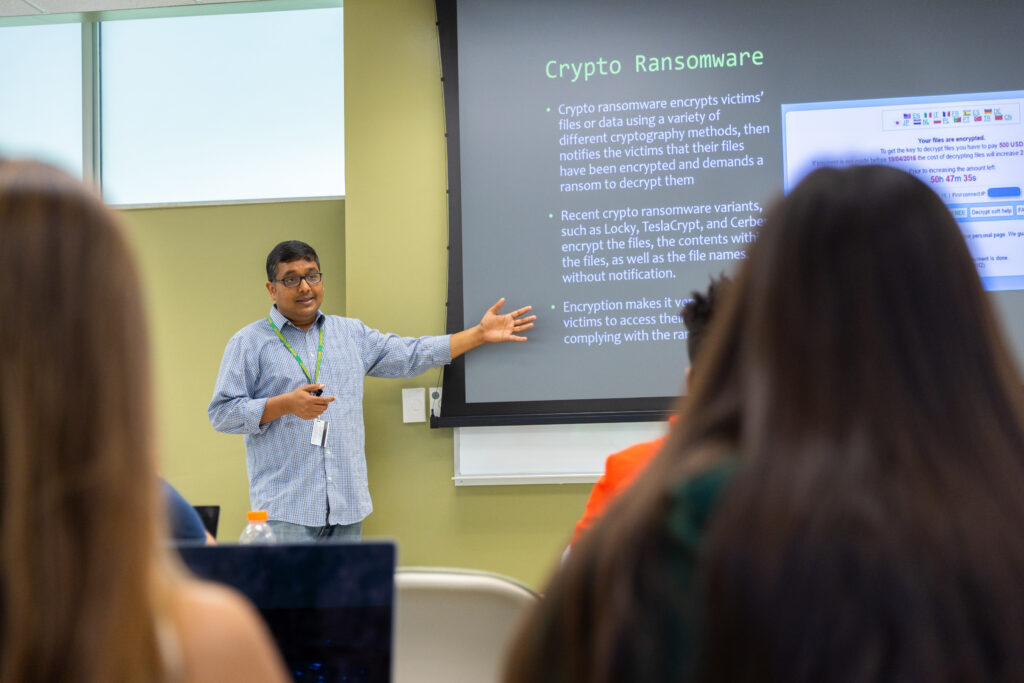
Ramamoorthi says the ITD advisory board regularly consults industry partners like Kaseya to help guide curricula. Industry partners, which include the Underline – a nonprofit that is revitalizing 10 miles of linear park under the county’s Metrorail– are a regular presence in course design, posing challenges and serving as clients for student work. The idea: Expose students to real world problems and place them directly into the hiring pool.
UM is also incorporating AI, Augmented Reality (AR,) and Virtual Reality (VR) across other degrees, since more jobs will be using these technologies. In the School of Communication, students are learning about video game law and the video game industry. In the College of Arts and Science, students are taking a religious studies course in the Metaverse that transports them to religious sites, and in the Miller School of Medicine, students are doing ophthalmology rotations with VR.
UM also offers tech programs outside its current student body, to high school students and professionals. Its Summer Scholars program gives high school students a chance to take a three-week credit program in computing, mobile app development, fintech, and cryptocurrency. These credit programs give students a leg up for a technology degree. And with UM’s Office of Professional Advancement, working professionals looking to upskill can find noncredit certificates in AI, coding, cyber security, and data analytics.
A PLACE TO COLLIDE: NOVA SOUTHEASTERN UNIVERSITY (NSU)
Nova Southeastern University, located in Broward County (adjacent to Miami-Dade County), belongs to that class of academic institutions in South Florida focusing on making Greater Miami a robust tech hub. While it offers degrees in computer science, cybersecurity, and data analytics, it’s the university’s Alan B. Levan/NSU Broward Center of Innovation that allows it to quickly adapt to the demand for techno talent, says John Wensveen, executive director of the center.
The Levan Center was founded in April 2022 as a public-private partnership between NSU and Broward County to promote economic development in South Florida. For Wensveen, who is also NSU’s Chief Innovation Officer, nurturing Miami as a global tech hub requires having innovative spaces and organizations that can regroup and react to the rapid pace of the industry. “The advantage of having an innovation center like [the Levan Center] is that we’re nonacademic in nature. And we purposely set it up that way, so that we can work with industry and government to identify what the opportunities are, and then how we can help create non-academic-related programming to serve industry needs,” says Wensveen.
Being nonacademic in nature means the Levan Center is open to more than just NSU students. Individuals interested in upskilling have access to industry certifications in AI, UI/UX design, spatial computing, coding, and cybersecurity. Wensveen says these programs are key to filling the tech pipeline because they connect to the existing workforce. Instead of waiting for the next crop of grads with 4-year degrees, corporations can access existing talent in the workforce.
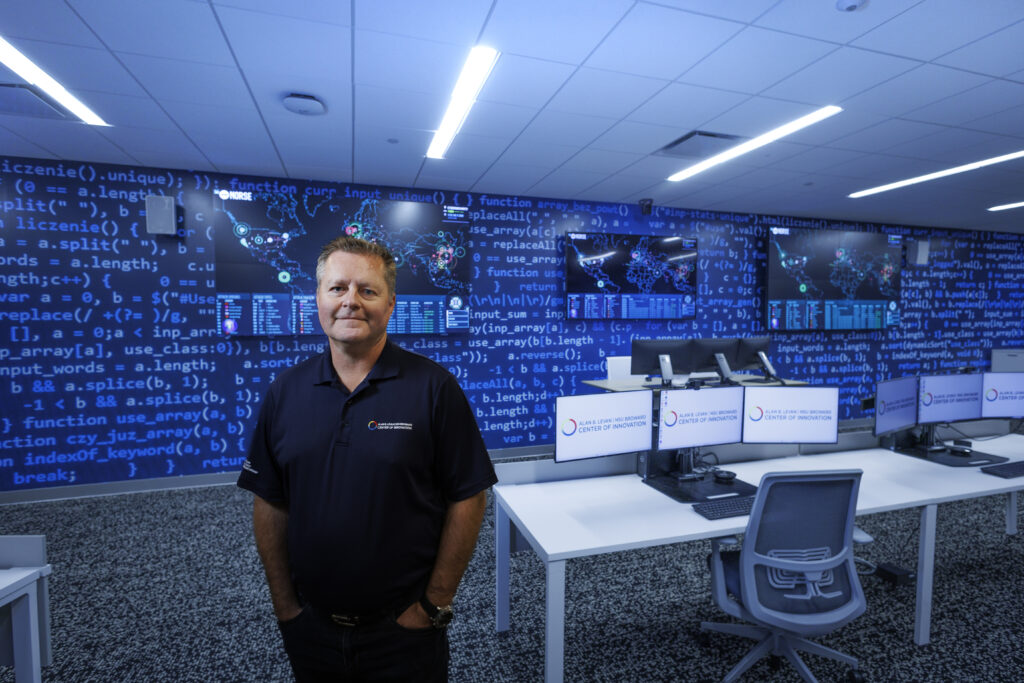
“Traditionally, there has been this huge demand that talent must have a degree, which is extremely important,” says Wensveen. “But the industry is also saying that industry certifications are just as important as degrees. And in some cases, even more important, because you can accelerate people into the workforce or [train] the existing workforce with new skills, upskilling, and rescaling opportunities.”
The Levan Center also stands out with its military-grade cybersecurity range. Working in conjunction with the university’s cybersecurity research programs, the Levan Center uses its range to simulate real-time cybersecurity attacks. “Most people learn cybersecurity in a standard classroom with a regular old computer. This is a bit different,” says Wensveen. “The best way to compare is if you have a gun, and you go to a shooting range for target practice. That’s exactly what the cyber range is. It is your target range to fend off attacks and learn how to be reactive and proactive.” The center is developing cybersecurity training programs for mid and advanced-level professionals, in addition to entry-level students.
The Levan Center also acts as a convergence point for players in the tech ecosystem. With its events and workshops, the center connects talented students to industry; partners like the CIO Council of Florida, Dell, and Sony offer job opportunities. “We believe in utilizing the Levan Center as a ‘collision station’ that truly forces entrepreneurs and students to collide with academia, industry, government, funders, professional networks, et cetera,” says Wensveen.
RESEARCH-BASED CURRICULUM: FLORIDA ATLANTIC UNIVERSITY (FAU)
Another university filling the gaps in the South Florida tech pipeline is Florida Atlantic University in southern Palm Beach County. FAU’s College of Engineering and Computer Science offers undergraduate degrees in computer and data science, and graduate degrees in computer science, AI, and data analytics. Hari Kalva, FAU’s chair of the Dept of Electrical Engineering and Computer Science, says FAU’s strong point is incorporating the university’s cutting-edge research directly into its curriculum.
“Our students take courses that get constantly renewed. When a new area of AI develops, our faculty, since they’re close to research and continue to work on it, will immediately offer it as a course,” says Kalva. Research in AI and cybersecurity in particular is how FAU is giving its students a leg up.
In 2019, FAU was the first area university to offer a Master of Science in AI. In 2022, the university – along with others like FIU and Virginia Tech – received a grant from the National Science Foundation to explore how to secure communications over 5G networks; research projects like these guide course material in undergraduate and graduate programs.

Kalva says the university’s industry advisory board, which includes leaders from local companies, also influences its technology-based curriculum. Partnerships with companies such as Microsoft and Bloomberg help guide university courses and give students direct access to tech jobs after graduation. FAU also offers tech certificates for students and professionals not enrolled in a degree program, so they can remain competitive in the talent pool.
Finding the Niche: Barry University
Smaller private universities like Barry University are also finding ways to fit into the equation with specific programs. “For a school like Barry, it’s about finding our niche. We’re a school of 7,000 students. What we’re trying to do is define the gaps and identify the role we can have to meet critical employment demands,” says Michael Allen, Barry University President.
Like many other institutions, Barry has a computer science program with specializations in data analytics, which includes AI, as well as cybersecurity and digital media. Barry also emphasizes building student skills with industry certifications to complement and give students a competitive edge for jobs. “The ideal scenario is to create and produce graduates who have that four-year degree but also pick up all the certifications along the way,” says Allen.
Barry is working closely with corporations to guide curriculum and place students in the job pipeline. As a part of its four-year degrees, Barry is partnered with Kaseya and Aptima to offer students internships and experiential learning while still in school. The university currently offers Kaseya’s RITSM certifications along with CISSP® (Certified Information Systems Security Professional), CompTIA® (Computing Technology Industry Association), Cybersecurity, Interactive Design Media, Social Media, UAV (Drones) Technologies, and WordPress. In addition, Tiffani Malvin – Barry’s director of continuing education and portfolio program – is a trainer for the Miami Tech Talent Coalition and serves on the tech skills gap group.
NON-ACADEMIC TRAINING PROVIDERS: 4GEEKS ACADEMY
Miami’s private sector also plays an important role in preparing and educating Miami’s workforce for the tech pipeline. Training boot camps are another part of the equation; when Miami Tech Works was formed, its members identified the need for tech training boot camps to meet employment demands. Since tech training boot camps are skills-based and shorter than an academic degree program, they can be an effective way to reach the incumbent workforce.
So, Miami Tech Works chose two tech training boot camps as sub-awardees of the $10 million grant. Both are receiving grant money in the form of scholarships for their respective programs.
One of these is the 4Geeks Academy, a coding boot camp founded in 2015 by Marcelo Ricigliano and Alejandro Sánchez. Before starting 4Geeks, the pair had launched a few of their own start-ups where they repeatedly faced the challenge of finding tech talent. Eventually, they decided to create a school to train workers for entry-level and mid-level tech jobs. “There was always a crisis of talent. Before the Academy, we needed to train [talent] inside, and then make sure they were able to actually build the applications that we needed,” says Ricigliano. “That’s how 4Geeks was created – because there was a huge talent crisis. And there still is an important gap in the industry.”

Since its start, 4Geeks has expanded across the U.S., Europe, and Latin America with eight campuses and over 120 people working for the company. But even with such a wide footprint, 4Geeks is doubling down on its efforts to solve Miami’s tech talent problem. More significantly, the company currently offers boot camps ranging from 15-18 weeks. Interested individuals can join its coding boot camps, data science and machine learning boot camps, software engineer boot camps, or its AI/machine learning engineering program. 4Geeks will next launch blockchain and web3 programs. From its inception, the company has had a close relationship with MDC. As early as 2016, MDC partnered with 4Geeks to create a web development course that allows students full access to 4Geeks instructors, features, and course material, with in-person classes at MDC’s campus. On the nonprofit side, 4Geeks works with organizations like United Way and BITE-CON to provide underserved communities scholarships for 4Geeks boot camps.
BRAINSTATION
BrainStation is the other tech training provider chosen by Miami Tech Works. Founded in Toronto in 2012, BrainStation came to Miami in 2021 when it acquired and merged with Miami-based Wyncode. Established in 2014, Wyncode was the first tech training boot camp to take hold in Miami and the first boot camp of its kind to be licensed by the Florida Department of Education for independent education.
When BrainStation was considering opening a Miami campus, it seemed natural to acquire Wyncode, according to Johanna Mikkola, VP of BrainStation Miami and former CEO of Wyncode. Both companies’ goals were aligned, and while BrainStation brought global resources to the table, Wyncode’s early entrance into the Miami tech scene provided local connections.

Aside from Miami, BrainStation currently has campuses in New York, Toronto, Vancouver, and London, and also offers courses online. Despite its wide reach, says Mikkola, BrainStation sees great potential in the Miami market and its role in filling the Miami tech pipeline. “It’s really beautiful to be in an emerging tech ecosystem like Miami,” says Mikkola. “Our mission here is about empowering individuals, to make sure that they are benefiting from the digital transformation that we’re all experiencing.”
As a sub-awardee of the Good Jobs Challenge grant, BrainStation is offering chosen applicants a full scholarship for its boot camps in either software engineering or UX Design as well as career and placement support. Its first cohort of 30 scholarship recipients, who started the boot camp in September, already graduated at the end of November. “Toward the end of the program, we bring in a leading global brand to do work with the students. They provide a problem, and the students actually build a solution for the company. It’s a really important and wonderful thing for their portfolios and a great way to engage with companies that are hiring,” says Mikkola.
Similar to universities and colleges, the company works closely with local tech companies to guide curricula. “The most important thing is to make sure that we’re teaching relevant skills to the market. And the only way to know that is to get feedback from partners,” says Mikkola.
IRONHACK
Though not a chosen training partner of Miami Tech Works, Ironhack tech boot camp plays a vital role in filling gaps in the workforce pipeline. Founded in 2013 by friends Gonzalo Manrique and Ariel Quinones, Ironhack was initially created to bridge the gap between unemployed youth and companies that needed software developers in Spain. In 2015, the company expanded to Miami, and now, ten years later, Ironhack has additional campuses in ten cities in Europe and the Americas. It boasts over 20,000 graduates and works with over 600 partner organizations.
Like other tech boot camps, Ironhack offers programs in web development, data analytics, and UX/UI design, and even has free courses in JavaScript. However, the company differentiates itself by offering specialized programs tailored to specific company needs. For example, Ironhack recently partnered with Popular Bank to create custom software engineering training to fill emerging positions at the bank.

Lisa Nuessle, Ironhack’s Head of Enterprise for its U.S. division, says Ironhack works on both sides of the equation because it provides training for students and facilitates the hiring process for a company’s HR. “It’s really aligned with companies building their workforce how they want it,” says Nuessle. “Universities have great foundations for computer science students, but it’s hard to keep up with the pace of what’s in demand now. We’re able to take those university students and close the skill gap through our intensive trainings.”
Ironhack is not just for recent university graduates, says Nuessle. A large portion of their students are individuals looking to upskill or reskill, possibly altering their career trajectory. Though Ironhack doesn’t have direct partnerships with academic institutions, the company hosts events at its Marlins Stadium campus and sponsors events like INIT’s Shellhacks.
FINAL PIECES
As an active member of the Miami Tech Coalition, Ironhack is another piece in the puzzle of how to fulfill the future workforce needs of Miami. It’s entrenched in the city’s tech ecosystem, contributing along with the area’s schools to the talent conversation. The question for these and other providers of tech training is whether they can meet the demand. The other half of the equation is communicating the opportunities for potential workers.
Venture Miami is the city’s economic development office, initially created to encourage tech talent to relocate to Miami. However, as the city’s ability to train its own residents has grown, Venture Miami is now focusing on connecting Miamians to the pipeline. One of its main roles today is spreading awareness about tech jobs to Miami residents. Right after Kaseya’s announcement, the office created an awareness campaign with digital signage across the city. Executive Director Erick Gavin says that residents aren’t always aware of the types of tech opportunities available in their own city, and moreover, don’t realize that a “tech” job isn’t necessarily all about coding and software engineering. Many of the jobs brought in by these tech companies are in sales, HR, and marketing. “We just want to continue to fill the gaps where we think that citizens are maybe not getting access to those tech jobs. So yes, Kaseya is opening up thousands of jobs, but do our residents even know that those jobs exist?” asks Gavin.
Like the other entities determined to grow the local tech workforce, Venture Miami is now keen on education. In partnership with the Miami Foundation, it’s closing the gap for at-need City of Miami residents pursuing a STEM education. With its Venture Miami Scholarship, it provides tuition support to selected applicants going to either Florida International University, Florida Memorial University, Miami-Dade College, or the University of Miami.
In the end, it will require the combined efforts of all these entities, public, private, and academic, to train and prepare Miami residents for the incoming tech jobs, and thereby create a foundation for the city’s new role as a global technology and innovation hub.







